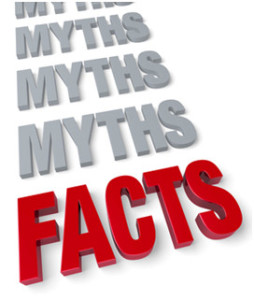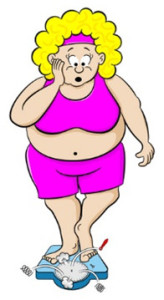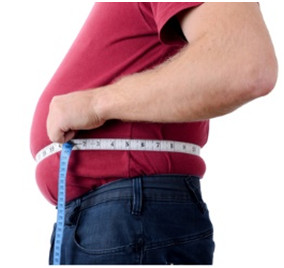Why Your Weight Is Increasing Rather Than Decreasing
Author: Dr. Stephen Chaney
 Usually I review scholarly publications of clinical studies, but occasionally I find an article in the popular press that’s so good I just have to share it with you. The lead article about weight loss by Bonnie Liebman in the April 2015 issue of Nutrition Action is just such an article. She called it “8 Weight Mistakes”, but I think “8 Weight Loss Myths” would be a better title.
Usually I review scholarly publications of clinical studies, but occasionally I find an article in the popular press that’s so good I just have to share it with you. The lead article about weight loss by Bonnie Liebman in the April 2015 issue of Nutrition Action is just such an article. She called it “8 Weight Mistakes”, but I think “8 Weight Loss Myths” would be a better title.
There are certain weight loss myths that are repeated so often that most people believe they are true. Unfortunately, each one of these myths is a “fat trap” that can sabotage your efforts to achieve a healthy weight. If your New Year’s weight loss resolution isn’t going as well as you would like, it may be because you are still holding on to one or more of these myths.
Weight Loss Myth #1: I Can Lose It Later
It’s easy to tell yourself that you don’t need to watch your weight during the holidays or while you are on vacation. After all you can cut back a bit when those special occasions are over and lose that extra weight. What makes that belief particularly insidious is that it actually worked for you when you were in your teens or early twenties. Why doesn’t it work anymore? There are 4 reasons:
 On most diets you lose muscle as well as fat. I have talked about this in a previous article, High Protein Diets and Weight Loss , but muscle is important because it burns off calories much faster than fat.
On most diets you lose muscle as well as fat. I have talked about this in a previous article, High Protein Diets and Weight Loss , but muscle is important because it burns off calories much faster than fat.
- Your organs become smaller. For example, as you lose weight your heart doesn’t have to service as many miles of blood vessels, so it can become smaller as well. That’s important because your heart works so hard pumping blood that it burns off calories much faster than resting muscle.
- Once you have lost a significant amount of weight exercise burns fewer calories. If you don’t believe that, try lugging an extra 10 or 20-pound weight up a flight of stairs.
- Your metabolism slows down. This is particular true if you try to lose weight too fast as I have explained in my “3 Things Every Successful Diet Must Do” eBook, which is available at Health Tips From the Professor.
Just in case you are still a doubter, Ms. Liebman shared a study in her article that showed most people never lose all of the weight they gained during the holidays before the next holiday season starts. Does that sound familiar?
Weight Loss Myth #2: Once It’s Off, It’ll Stay Off
 You’ve heard this one before. However, even on the most successful diets, weight loss is temporary. Most people eventually regain all the weight they’ve lost and more. Again I’ve also covered the reason for this in my “3 Things Every Successful Diet Must Do” eBook, which is available at Health Tips From the Professor. To spare you the trouble of reading the book I will share the secret with you. Simply put: “Diets never work long term. Only true lifestyle change can lead to long term weight loss.”
You’ve heard this one before. However, even on the most successful diets, weight loss is temporary. Most people eventually regain all the weight they’ve lost and more. Again I’ve also covered the reason for this in my “3 Things Every Successful Diet Must Do” eBook, which is available at Health Tips From the Professor. To spare you the trouble of reading the book I will share the secret with you. Simply put: “Diets never work long term. Only true lifestyle change can lead to long term weight loss.”
However, that doesn’t stop people from believing that the next “magic” diet will be their ticket to permanent weight loss. It always amazes me that people fall for this same myth time after time.
Weight Loss Myth #3: Fat Is Fat, No Matter Where It Is
Most of you probably already knew that belly fat (the so-called apple shape) is metabolically more dangerous to our health than thigh & leg fat (the so-called pear shape). However, some of the other information Ms. Liebman shared was a surprise to me.
- It turns out that belly fat is actually easier to lose than thigh & leg fat. As you add fat to your lower body you create lots of new fat cells
 (2.6 billion new fat cells for every 3.5 pounds of fat). Once you add that extra fat to your lower body you’re pretty much stuck with it.
(2.6 billion new fat cells for every 3.5 pounds of fat). Once you add that extra fat to your lower body you’re pretty much stuck with it.
- Of course, you can’t add new fat to your belly forever without creating new fat cells, and once you’ve created those new fat cells you may be stuck with your belly fat as well.
Weight Loss Myth #4: You Have To Go Out Of Your Way To Overeat
It’s really difficult to understand how anyone could believe in this myth. The fact is that we live in a “fat world”. There are fast food restaurants on virtually every street corner in every city and in virtually every mall in this country. Restaurant portion sizes are through the roof. Every social interaction seems to be centered around food or drink.
You don’t need to go out of your way to overeat. Overeating has become the American way. You actually need to go out of your way to avoid overeating.
Weight Loss Myth #5: All Extra Calories Are Equal
Research has confirmed what many of you probably suspected already. All calories are NOT equal. Calories from alcohol, saturated fats, trans fats and sugars make a beeline for your belly where they are converted into the most dangerous form of fat.
Weight Loss Myth #6: I Can Just Boost My Metabolism
 Many Americans cling to the false hope that they can eat whatever they want as long as they take some sort of magic herb or pill to boost their metabolism. The fact is that natural metabolic boosters like green tea have a very modest effect on metabolism. They can play a role in a well-designed diet program, but they will never allow you to eat whatever you want and lose weight.
Many Americans cling to the false hope that they can eat whatever they want as long as they take some sort of magic herb or pill to boost their metabolism. The fact is that natural metabolic boosters like green tea have a very modest effect on metabolism. They can play a role in a well-designed diet program, but they will never allow you to eat whatever you want and lose weight.
As for those magic herbs and drugs that promise to burn off fat calories without you lifting a finger, my advice is to avoid them like the plague. I’ve talked about many of them in my previous “Health Tips From the Professor” articles. For example, you might be interested in my articles “Are Dietary Supplements Safe?” or “Are Diet Pills Safe?”. The bottom line is that these metabolic boosters are dangerous – and they just might kill you.
Weight Loss Myth #7: There’s A Magic Bullet Diet
Hope springs eternal. Perhaps that’s why so many new diets appear each year. Some diets are low fat, some are low carbohydrate, some hearken back to cave man times, and others are just plain weird. Some of them actually do give better weight loss than others short term. However, when you follow people on those diets for two years or more, none of them work very well (see myth #2), and there isn’t a dimes worth of difference between them.
Weight Loss Myth #8: I Can Work Off The Extra Calories
 This is perhaps the most pervasive myth of all. This is the one that sells millions of gym memberships every January.
This is perhaps the most pervasive myth of all. This is the one that sells millions of gym memberships every January.
Don’t get me wrong. Diet plus exercise can be very beneficial because it helps you retain muscle mass as you are losing weight, especially if you are consuming enough protein to support the exercise.
However, exercise alone isn’t going to help you nearly as much as you think.
- You’d have to ride your bicycle for an hour and 25 minutes to offset the 500 calorie dessert you just consumed at your favorite restaurant.
- Exercise helps some people more than others. Studies show that some people get hungrier when they exercise. As a result, they eat more calories and actually gain weight rather than losing it.
- Finally, don’t rely on your fitness trackers. Most of them grossly overestimate the calories you burn through exercise. If you use a fitness tracker you should cut their estimates for calories burned by 50% or more.
The Bottom Line
A recent article shared the 8 most common weight loss myths. If you actually believe any of these myths, you will have a very difficult time getting your weight under control.
- I can lose it later.
- Once it’s off, it’ll stay off.
- Fat is fat, no matter where it is.
- You have to go out of your way to overeat.
- All extra calories are equal (A calorie is a calorie).
- I can just boost my metabolism.
- There is a magic bullet diet.
- I can work off the extra calories.
These statements have not been evaluated by the Food and Drug Administration. This information is not intended to diagnose, treat, cure or prevent any disease.
